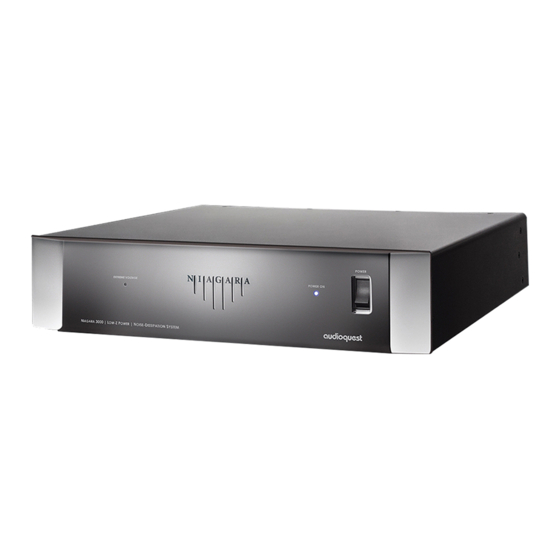AudioQuest Niagara 3000 Manual del usuario - Página 14
Navegue en línea o descargue pdf Manual del usuario para Distribución de corriente alterna AudioQuest Niagara 3000. AudioQuest Niagara 3000 20 páginas. Low-z power noise-dissipation system
También para AudioQuest Niagara 3000: Manual de inicio rápido (2 páginas)

My Niagara 3000 has no power amplifiers connected to it, but it sounds odd or not
quite the same as it once did.
The Transient Power Correction Circuit also affects the Level-X Linear Noise-Dissipation Circuits. Make certain that
the rear-panel Power Correction switch is in the "energized"/"1" position.
A technician or electrician found that my Niagara 3000 consumes over 4 amps of
current. Is it broken?
No, it's not broken, and it's not drawing 4+ amps in any conventional sense. The Niagara 3000's Transient Power
Correction Circuit creates a reactive current draw of as much as 4 to 5 amps RMS at idle, and, when incorporated with
power supplies such as those found in power amplifiers, the current readings decrease. This is a vector load, which will
vary with the connected equipment. When plugged into an AC service that has no other electrical draw, it is typical to
see a real-world RMS power draw well below 30 watts at idle.
My home or grounds were hit by lightning. The Niagara 3000 seems to be
functioning properly. Should it be sent in for inspection or service?
If you see or smell smoke coming from the unit, it needs service. Otherwise, if it functions after such an event (which
is very likely), there is nothing that would be compromised or damaged. If it fails after such an event, it will fail totally.
However, it's unlikely that this would occur. The circuit is designed to easily handle any voltage or current surge that
could possibly make it past an electrical panel. The force required to damage the Niagara 3000 via a power surge
would melt the panel and burn the building (in which case, the Niagara 3000 is the least of your worries).
I broke off an AC plug tab while connecting or removing one of my AC cords. The
tab is stuck in the outlet. What should I do?
First, turn off or place on standby/mute all of your components, then turn off the Niagara 3000. Next, only after
you are absolutely certain that the power switch is off—you could also remove the input AC cord for even greater
safety assurance—use a strong set of pliers or a small handheld vice grip tool to grasp the portion of the tab that is
protruding from the NRG Edison outlet. While producing moderate outward pressure, gently wiggle the tab until it
pulls free from the outlet. This should be all that is necessary, and the outlets should be fine.
This will be a rare occurrence, but, because the gripping strength of the NRG Edison outlets is far greater than
that of generic or audiophile-grade AC Edison outlets, it is possible, if: An AC cord plug has tabs that are slightly
oversized or An AC cord plug has plating that is overly thick; or an AC cord plug is installed or removed in haste.
How do I clean the chassis and/or the electrical contacts?
The Niagara 3000's black-painted chassis and dark chrome front panel can be cleaned with AudioQuest
CleanScreen, automotive polishing creams, or a modest misting of household window cleaners. Please use soft
cotton or wool toweling to remove the liquid from the metal and painted surface. Whenever possible, use the
supplied polishing rag for the front panel, only using liquid cleaner when oil or grime is beyond the polishing
cloth's capacity to thoroughly clean. Never use alcohol or solvent-based cleaners. They can damage the surfaces,
paint, and silk-screening material.
The AC inlet, outlet posts, and grips are all generously plated with silver. There is no need to clean these if they
are not exposed to foreign substances such as grease and dirt. Silver oxide is a superior conductor to silver itself.
If cleaning is required, Isopropyl alcohol (preferably 99% purity) on a cotton swab is best for the inlet tabs. Some
manufacturers provide specialized cleaners for the AC output surfaces. Again, however, cleaning these surfaces
will most likely be unnecessary.
Note: A pipe cleaner or cleaning swab with a wood stick and compact wool tip (available from an electronics
supply house) will be superior to household swabs. When working in a small area such as an AC outlet, this is
critical. Loose strands of cotton may damage the AC outlet. Damage to an AC inlet or outlet due to cleaning is not
covered under your warranty. If you damage an inlet or outlet in an attempt to clean it, you will be charged for the
14
